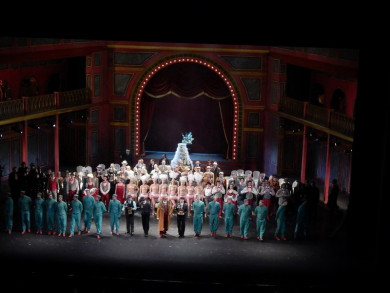Expanding its collection of Verdi’s rarities, which already makes boast of Attila and La forza del destino, in 2017 the Mariinsky Theatre has put on I vespri siciliani. This masterpiece of the once-popular French grand opera genre, with its characteristic vividness of historic background and an obligatory ballet divertissement in the third act of the standard five, is not a common title for any opera house of the world.
The staging by Arnaud Bernard transposes the setting from the 13th century Sicily to New York of the 1920s – an era glorified by such films as Godfather and Once upon a Time in America. The medieval Sicilians’ guerilla against the French invaders transforms seamlessly into the Italian immigrants’ struggle for the chance to live their American dream. The land of equal opportunity would not welcome its new citizens with open arms: New York Police Department is so corrupt that the Sicilians are forced to violate the laws of their new homeland. Venal police commissioner Monforte, his unscrupulous mafioso archenemy Procida, zealous vengeance-driven Elena and lovesick maximalist Arrigo – in this production everyone wears their true colours.
But listening reveals other dimensions: Verdi found warm intonations for each character and displayed each personality in multiple aspects – the antagonist Monforte suddenly appears a tender father in his soliloquy; Elena abandons her longing for vendetta as she sings her sparkling, sun-soaked bolero. The composer brought in some vocal challenges as well: Arrigo’s aria is mercilessly put in the fourth act, requiring all the stamina a tenor might have; and Procida’s is one the most extensive bass parts in any opera, so no wonder that it was Ildar Abdrazakov himself who suggested that Valery Gergiev should have added I vespri siciliani to the playbill. Abdrazakov performed this part in the Teatro Regio in Turin during the celebrations of the 150th anniversary of Italian independence. The rest of the cast learnt the unfamiliar score with passion, and the premiere run saw the brilliant performances by Irina Churilova, Migran Agadzhanyan, Vladislav Sulimsky, Kirill Zharovin and Stanislav Trofimov.
 Mariinsky Theatre:
Mariinsky Theatre:  Mariinsky-2 (New Theatre):
Mariinsky-2 (New Theatre):  Mariinsky Concert Hall:
Mariinsky Concert Hall: 

